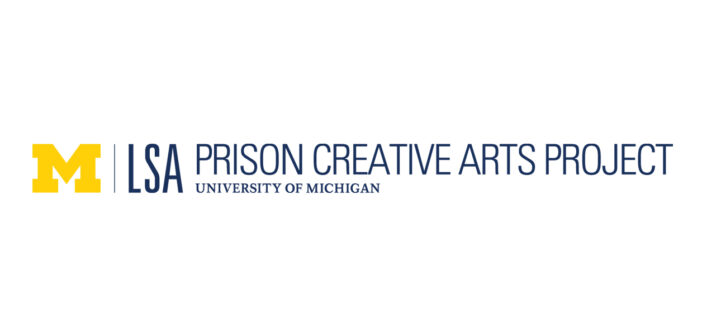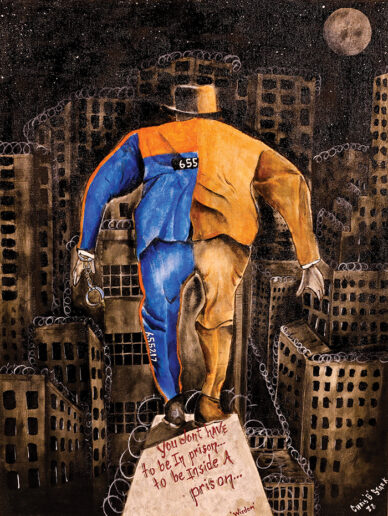Earlier this spring, the Prison Creative Arts Project (PCAP) concluded its 27th Annual Exhibition of Artists in Michigan Prisons at the James and Anne Duderstadt Center Gallery in Ann Arbor. The PCAP brings the art and talent of those impacted by the justice system to local communities for collaboration, mutual learning and growth. “We see art as a common language for people to connect with others across distances and differences,” says PCAP Director Nora Krinitsky. “PCAP connects justice-impacted persons to others through multiple programs such as the art exhibition, creative art workshops in prisons, our yearly literary journal and more.” “We’ve represented over 360 artists from all correctional facilities in Michigan,” says PCAP Community Engagement Specialist and Curator, Sarah Unrath. “There is a beautiful community of talented artists that exists in Michigan’s correctional facilities.” If you missed the exhibition in early spring, don’t worry. PCAP’s traveling exhibit entitled “Shared Humanity” will be coming to Flint in August. “We will open the exhibition on August 11 during the Flint Art Walk at the Greater Flint Arts Council, and I’m so excited!” Unrath exclaims.
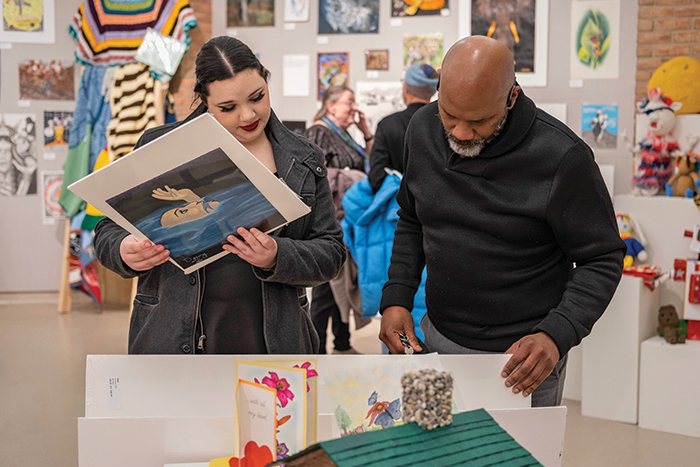
The PCAP “Shared Humanity” exhibit will be open at the Greater Flint Arts Council Gallery in Downtown Flint from August 11 – September 1. PHOTO BY NATE KENNEDY
The PCAP traces its roots back to 1990 and University of Michigan English Language and Literature Professor, William “Buzz” Alexander. “Buzz first visited the Florence Crane Women’s Facility in Coldwater (MI) to conduct a theatre workshop with the inmates there,” Unrath explains. “He brought university students with him. It was such a wonderful experience that it continued year after year.” The Prison Creative Arts Project was soon established and expanded to include other forms of expression such as writing and music. At Florence Crane, the theatre troupe founded by Alexander in 1990, The Sisters Within, continues today even after closure of the Florence Crane facility.
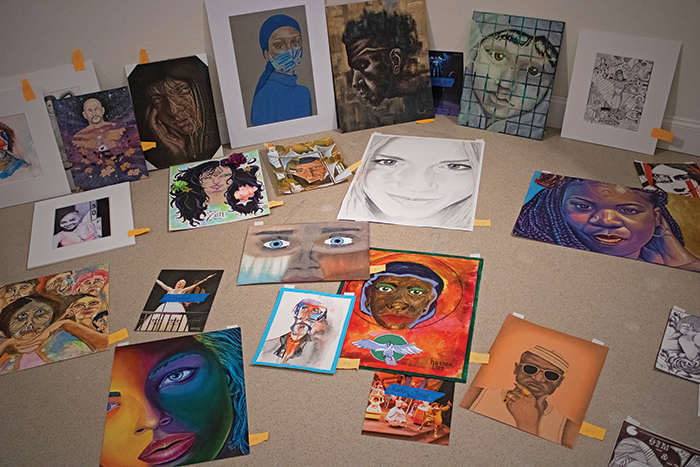
Portraits await placement for the exhibition. PHOTO BY IEVA SURANTAS
Today’s PCAP visual arts exhibition was started in 1996 by Janie Paul, Buzz Alexander’s wife and a local Ann Arbor artist. “She accompanied Buzz to a theatre workshop he was conducting and saw the visual art they were creating. She was compelled to bring it to the public,” adds Unrath. The first exhibition opened with a collection of 50 pieces and has grown to include 645 to date. “What we’ve found is that almost 90% of inmates pick up their first paintbrush while in prison,” says Unrath. “For them, it can be self-therapeutic or meditative. Artists will often say they have found themselves in art. I feel the value for them is greater than for those who are free with more resources and connections.” Nora Krinitsky adds, “PCAP is a vital lifeline and connection to people in the world for the incarcerated and justice-impacted. The incarcerated are normally erased from the public consciousness. PCAP changes that. It can be a source of social, financial (for those who sell their artwork) and emotional support.”
Anyone currently incarcerated in Michigan is eligible to be included in the PCAP exhibition as chosen by a group of University curators. Working with each prison’s special activities coordinator, PCAP would visit each prison and spend time viewing the art and speaking with the artists. “We have a curatorial team of seven people made up of community members and students,” explains Unrath. “We go into the facilities and meet the artists and talk to them about their work and as a team, we select the pieces for the exhibit. It’s my favorite part of the process and I get excited every year.” The chosen works are displayed during the two-week exhibition when they are also available for purchase. The artist sets their asking price and, if sold, the funds go directly to the inmate. Proceeds above the asking price will go toward sales tax and the Michigan Department of Corrections to aid the inmate benefit fund. After the exhibition, the artist has a choice to either designate their art to a family member or friend on the outside, or donate it to the PCAP. The “Shared Humanity” exhibit in Flint in August will be composed of donated items and all purchases during the exhibition will benefit the PCAP programs. “We worked out a deal with the Department of Corrections to allow inmates to gain proceeds from their art sales but only for the window of the main exhibition,” says Unrath.
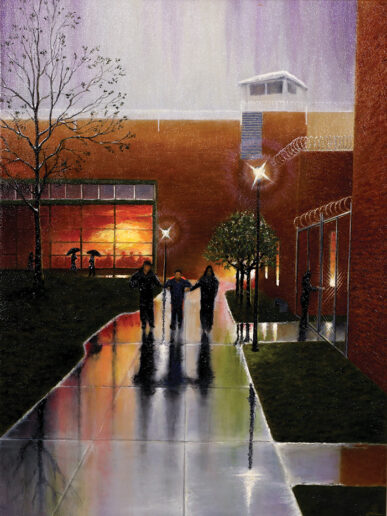
“The New Arrival” Doc Collison, 2022
Kicked off on March 24, the Exhibition of Artists in Michigan Prisons encompassed much more than art. It was a way for families of the incarcerated to view the talent of their loved ones and to speak about them and their works. The exhibition opened with a celebration and keynote presentation, followed by a Public Resource and Awareness Fair, where people learned about some of the issues of mass incarceration in the United States, reentry and available resources. Next, an artist talk was held when released artists spoke about their life behind bars and the art they have made and continue to make. Many of the speakers are made up of PCAP’s Linkage community – an alliance of system-impacted artists who support artist development and opportunities. After the visual opening, the writers then have their day with a literature review and the launch of the PCAP yearly story anthology made up entirely of stories written by incarcerated persons. The first week concluded with speaker Amanda Alexander, Executive Director of the Detroit Justice Center. Many of the same festivities are planned for the “Shared Humanity” exhibit in Flint.
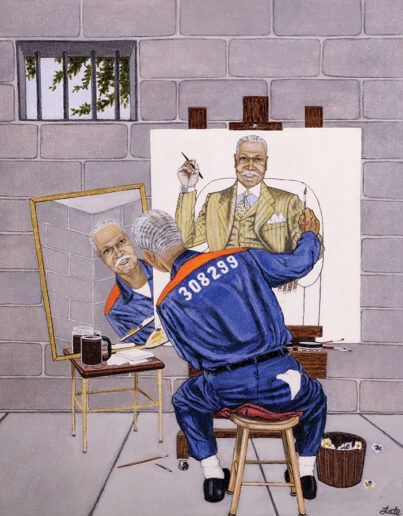
“Self Portrait: A Tribute to Norman Rockwell”
Robert Tate, 2022
“In Flint, we are going to open with a reception from 6-9pm on August 11 at GFAC,” says Unrath. “Next, we will host a special storytelling event when artists can tell stories about their lives and about producing art in a correctional facility. I guess you could say it’s similar to ‘The Moth’ on NPR.” Also in Flint on August 31, the PCAP will screen the documentary “Master of Light” chronicling a formerly incarcerated artist’s journey home to paint his family members and answer to his past.
The project started years ago by Buzz Alexander and his wife continues to provide opportunity and salvation to those who may never have the chance to discover, cultivate, or show their creative talent. Many talented individuals will never be released from prison and this may be their only chance to express themselves to the world. “Many of our artists have said that being creative, finding and producing art while in prison was life-changing and often, life-saving,” states Unrath.
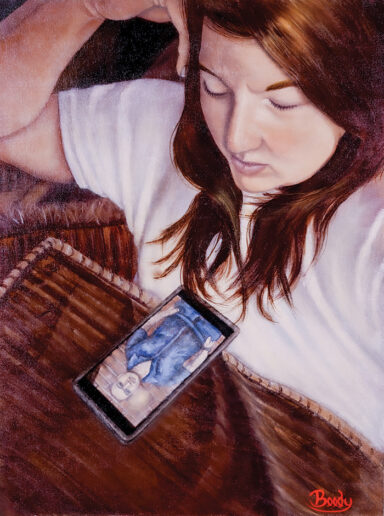
“Love Shared Over Distance and Time”
Brian Boody, 2022
The PCAP “Shared Humanity” exhibit will run August 11 through September 1 at the Greater Flint Arts Council Gallery in Downtown Flint. During the exhibition, art will be for sale with proceeds supporting PCAP programs.
If you would like to support the Prison Creative Arts Project at the University of Michigan, please visit leadersandbest.umich.edu/find/#!/scu/lsa/pcap. For more information, visit lsa.umich.edu/pcap

